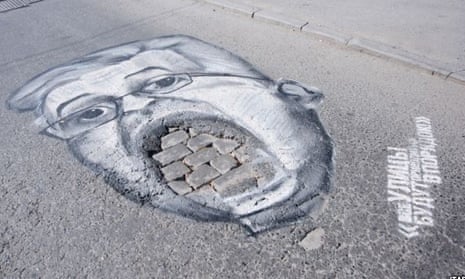Russian activists have taken to showing their anger about the poor state of the country’s roads by painting mocking caricatures of local officials over gaping potholes, transforming them into comically grotesque mouths.
One such image recently discovered in the city of Saratov has drawn significant attention – and even complaints from the politician in question about the accuracy of the depiction.
The portrait of local governor Valery Radayev on a central street in the city has even sparked accusations of a political “hit job”.
In response to the street art, local authorities quickly dispatched a cleaner to the scene, though they were unable to scrub away Radayev’s likeness. Workers then proceeded to paint over the picture, and later filled in the hole.
Days later, Saratov police detained the caricaturist, a 20-year-old graffiti artist named Vikenty Belikov. He said that he was apolitical, and claimed that a local activist with the ultra-nationalist Liberal Democratic Party paid him 10,000 roubles (£117) for the job.
“I would never go and draw a face resembling the governor’s over a pothole on my own initiative,” Belikov said in a telephone interview. “It’s just not interesting for me.”
The graffiti artist chose his words carefully when describing the subject of his pothole portrait, saying only that he based it on a picture of someone who “resembled” Radayev.
He added that police had threatened to fine him up to 500 roubles for an administrative violation but ultimately decided not to. Police were more interested in finding out who paid him, Belikov said.
Radayev’s spokeswoman told a local news site that while the governor had a sense of humour, he didn’t recognise himself in Belikov’s portrait.
“It doesn’t look like me,” she quoted the governor as saying.
The head of the Saratov region’s public council claimed the pothole art was aimed at smearing the governor.
“While regional authorities are doing all they can to secure resources for roads amid the difficult conditions presented by a budget deficit, others are trying to score political points with petty, dirty tricks,” an official, Aleksandr Lando, told news site SarInform.
A week earlier, a large municipal truck was immobilised after its front wheel plunged into the pothole, right in front of the regional branch of the All-Russian National Front, a movement formed by Putin in 2011.
Road shaming
Crumbling streets have long provoked outrage in Russia, where even president Vladimir Putin has attributed the condition of the country’s streets to pervasive corruption in the road construction industry.
But the shaming of particular officials to protest road conditions appears to have first emerged in 2012 in the Urals city of Yekaterinburg.
Last month, pothole caricatures of the city manager of Ryazan, 200 kilometres southeast of Moscow, were posted on a Twitter fan account dedicated to renowned guerrilla artist Banksy that has 1.3 million followers.
A graffiti artist painted mayor's face on top of potholes in Ryazan, Russia. pic.twitter.com/nSbDj7yxWM
— banksy (@thereaIbanksy) May 28, 2015
Ryazan police subsequently investigated more street images of the local administration head, Oleg Bulenkov.
The Ryazan incident has also prompted Russian State Duma deputy Sergei Mironov, a Putin loyalist, to criticise local authorities for choosing to paint over the images of Bulenkov before fixing the potholes.
Russian authorities have to tread delicately when dealing with discontent amongst the country’s drivers: in the past they have been known to mobilize large protest on issues ranging from import tariffs to road privileges flaunted by Russia’s ruling elite.

Comments (…)
Sign in or create your Guardian account to join the discussion